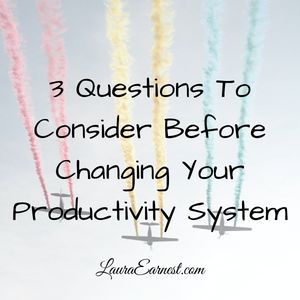I used to be on the cutting edge of productivity software. If there was a new tool out there, I tried it. I would spend days wrestling all my tasks, dreams, lists and whatnot into the new software, learning all the ins and outs of the software, only to be disappointed in the results, and repeat the process the next time new software would come out.
It occurred to me about years ago that this behavior is just a way of playing at being productive. After all, I was busy, and even if I wasn’t getting anything done, it was in the name of productivity, right?
Wrong.
The truth of the matter is any time you take on a new system, or adjust your present system, you will see a productivity dip as you assimilate the techniques. It may take the form of a temporary slowdown as you internalize new rules, or it may block work for hours or days.
Examples of False Productivity
I ran across two examples of this at work. The first occurred when I was forced to upgrade my Microsoft Office. It did not have a clear upgrade path at the time, and the most familiar things to me, menus, were taken away. Luckily, I found out that the keyboard shortcuts I use to still work, so I rely on these. However, as I got deeper into the bowels of Excel, I realized it was going to take me twice as long to produce a report, simply because I could not edit the formulas as I had been used to doing. I was going to have to work within the parameters of Excel, and do it their way.
The second instance was a new project management system that we started to use soon after I went back to work. I’m sure it will be a good system in the long run, but it is not organized in the way the programmers do work, and I have spent hours searching around the system, looking for the bits I am supposed to do, and then searching around trying to find out if previous bits have passed the “closing” point. In the past week, I have spent hours that I could have been doing productive work focusing on the new tracking system.
These are two extreme examples, I will admit, but at the same it highlights some crucial questions to consider before moving to a new system:
Three Questions
How long will it take me to get up to speed? For some software, it might be a few minutes. For others it could be days or weeks, particularly if there is no help in the form of training or documentation available.
Are the gains going to outweigh the short term impact? I don’t think there is a magic bullet out there. No system will be perfect, and we have to consider if the actual gains are significant enough to warrant investing in the new system/technique.
What is the payback time? Good ol’ Return On Investment (ROI). If moving to a new software package will save you $50 a month, but the software itself costs $600, you will have a year before you get a return on your investment. Likewise, if a new technique will save you two hours a day, but will take you eight hours to learn, you will start turning a “profit” in four days.
All in all, it is important to consider what you hope to get out of a change before you commit to it.

